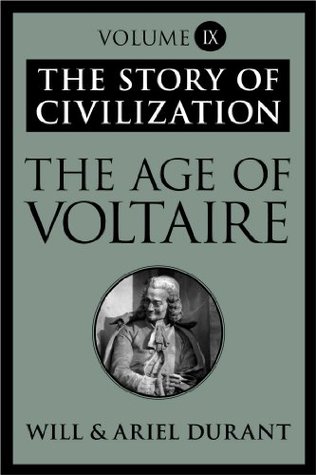More on this book
Kindle Notes & Highlights
by
Will Durant
Read between
September 26 - October 11, 2019
Events and personalities go hand in hand through time, regardless of which were causes and which were effects; history speaks in events, but through individuals.
Nuruddin Azri and 1 other person liked this
Passages in reduced type are especially dull and recondite, and are not essential to the general picture of the age.
Like most of us he was a confusion of characters.
“From six o’clock in the morning till night I am subjected to prolonged and fatiguing labor; if I did not amuse myself after that, I could not bear it; I should die of melancholy.”
“The justice refused to the Protestants by the two factions in the Church was won for them only by philosophy.”
under the pious Louis XIV he had read Rabelais in church;
But he shared the weakness of philosophers—the ability and willingness to see so many sides to a subject that time was absorbed in discussion, and decisive action was deferred.
Cheryl and 1 other person liked this
“He would have had virtues,” said Duclos, “if one could have them without principles.”
Wei and 1 other person liked this
and Claudine herself was conscious of a beauty that itched to be sold.
she was interested in science and philosophy, and sometimes (says Voltaire) she talked above her own head; but the head was pretty and titled, which made any metaphysic effervesce.
Wei and 1 other person liked this
She was one of the hundreds of gracious, cultured, civilized women who make the history of France the most fascinating story in the world.
Cheryl and 1 other person liked this
Charles Cressent, chief cabinetmaker to the Regent, established the Regency style with chairs, tables, desks, and bureaus brilliant with mother-of-pearl marquetry and gay with conscious loveliness.
He would have been a highly civilized man had he not suffered from thirst and an uncontrollable appreciation of beauty.
Samuel Burleigh and 1 other person liked this
He loved women from a timid distance, with all the longing of one too weak to woo; and he was moved not so much by cozy contours as by the luster of their hair and the sinuous flow of their robes.
Samuel Burleigh and 2 other people liked this
The doctors warned him that his mode of life was killing him. He did not care. He had drunk the wine of life too greedily, and had reached the dregs.
Wei and 2 other people liked this
Our priests are not what a silly populace supposes; all their learning consists in our credulity.”
We must not think of him as a revolutionist, except in religion.
Voltaire, he said, now owed him an epic and “a nice pair of sleeve ruffles.”
this “fortress built by Nature for herself against infection, … this blessed plot, … this England,”
Word peddlers tend to idealize the countryside, if they are exempt from its harassments, boredom, insects, and toil.
in Dante’s Florence factories were as numerous as poets;
the problem remained of finding some mechanical power to substitute cheaply for the muscles of men and the patience of women.
This clumsy and unsteady engine reached its zenith in the United Provinces in the eighteenth century, and then entered into its picturesque decline.
The capitalist was better able to organize quantity production and distant distribution; he had learned the subtle art of making money breed money; and he was favored by a Parliament eager for industrial capacity to supply far-ranging commerce and wars.
His wages were set by the hunger of men competing for jobs against women and children.
“The poor,” said a writer in 1714, “have nothing to stir them up to be serviceable but their wants, which it is prudence to relieve, but folly to cure.”
The age of “free enterprise” and laissez-faire had begun.
The great merchants were now rivaling the old landowning aristocracy in riches and power, determining foreign relations, fomenting and financing wars for markets, resources, and trade routes.
Aristocracy was passing into plutocracy; money was replacing birth as a title to power.


